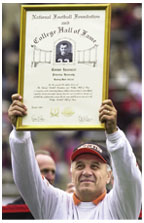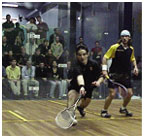January 29, 2003: Sports
A
Tiger for the ages
Cosmo Iacavazzi ’65 joins college football’s elite
International
intrigue
Men’s squash eyes national team title
Sports Web Exclusives! P-nut Gallery column


A
Tiger for the ages
Cosmo Iacavazzi ’65
joins college football’s elite
By Sophia Hollander ’02
Photo: Iacavazzi was honored at October's Harvard/Princeton game for becoming the third post-WWII Tiger player selected to the College Football Hall of Fame. (Frank Wojciechowski)
They stood side by side in the darkness, their large bodies blending together under the dim practice field lights. All except for one, who was wreathed in pale gray steam. It was 1964, and as Cosmo Iacavazzi ’65 huddled with his teammates, his perspiration evaporated into the crisp November air. As usual, he had continued running sprints after the Tigers were finished.
“It was like a halo, or an aura,” remembers John O’Brien ’65, Iacavazzi’s teammate and roommate at Princeton. “That just captured it for me. He was already perhaps the best player, and he still worked harder than any of us. He wasn’t the best athlete. He wasn’t fast or big. He was just more determined.”
In a few weeks, Princeton would travel to New Haven and defeat Yale in front of 70,000 fans on the strength of two Iacavazzi touchdown runs. The Tigers would win the Ivy title for the second straight season, preserving a perfect 9—0 record. Iacavazzi would lead the league in rushing, and be named a first-team All-American and honored as cowinner of the Most Valuable Player award of the Eastern Athletic Conference while playing both offense and defense.
But a brief attempt at a pro football career failed, and Iacavazzi, who had been an aeronautical engineering major, drifted away from the game. Though his name had been on the College Football Hall of Fame ballot for years, the induction days came and went every year without him.
Then, one day last spring, his former Princeton coach and friend Bob Casciola called and invited him to dinner. During the meal, Casciola raised his glass in a toast. “I’d like to congratulate the newest member of the College Hall of Fame,” he says.
Silence.
“He was emotional,” says Casciola, president of the National Football Foundation and the College Hall of Fame. “Very emotional. He looked at me and said. ‘You’re not kidding, right?’”
The next day, Iacavazzi called Casciola just to make sure. “I thought maybe my time had passed,” says Iacavazzi. “It was a wonderful moment.”
On December 10, Iacavazzi and 12 other inductees were honored at a dinner at the Waldorf Astoria in New York City. Ten tables were packed with family, friends, neighbors, and former teammates who came to show their support. In August, Iacavazzi and his teammates will fly to South Bend, Indiana, for the official enshrinement.
“The reason he’s so popular is that he’s so supportive of his friends,” says Griff Sexton ’65.
O’Brien, an orphan, called Iacavazzi’s parents mom and pop, and the pair shared clothes to fill the holes in each others’ wardrobes. “We both came from the other side of the tracks,” O’Brien says.
Iacavazzi grew up in blue-collar Scranton, Pennsylvania. His father ran a trucking company, hauling coal, while his mother stayed at home. Iacavazzi was recruited by schools such as Notre Dame and Penn State. “But I knew at some point the athletics would end and academics would prevail,” he says.
He worked hard, academically and athletically. He stayed up long into the night, studying past the time when O’Brien would crawl into bed, and ending each day with a love letter to his future wife. After struggling academically his freshman year, he became a national scholar-athlete as a senior.
A critical fumble in the last game of his junior year essentially cost the Tigers an outright Ivy championship. But Iacavazzi came back the next year and rushed for 909 yards and 14 touchdowns, and did not fumble once.
He joined the New York Jets after graduation, but had a frustrating season and saw little playing time. After one season, he returned to Princeton to complete his master’s degree in engineering, and then worked for Boeing Aircraft in Seattle before moving back east to enter the financial world.
Iacavazzi has remained active in alumni affairs, serving as class president and organizing reunions. He represents alumni on the Council of the Princeton University Community.
But football had remained a part of his past, until now. Not long after
he was named to the Hall of Fame, he began working in marketing and development
at the National Football Foundation. “It’s been real fun,”
he says. “It’s being reconnected again.” ![]()
Sophia Hollander ’02 writes regularly for PAW and the New York Times sports section.


International
intrigue
Men’s squash eyes national
team title
Photo: Yasser El-Halaby ’06 in the midst of his recent win over Trinity’s Bernardo Samper, last year’s national champion. (squashtalk.com)
Men’s squash coach Bob Callahan ’77 has witnessed plenty of change since he took over the team in 1981. Since then, American collegiate squash went to a soft ball to mirror the international game, a change that brought an influx of international players stateside. More recently, tiny Trinity College in Connecticut supplanted the Ivies as the best team in the college ranks, winning the last six national team titles.
But Callahan and his current Princeton squad are in the middle of what could be college squash’s next big shake-up, thanks to a stellar senior class and a freshman from Egypt, Yasser El-Halaby, a four-time British Open Junior Champion. El-Halaby already has beaten last year’s collegiate individual champion.
“He has the potential to be one of the best players ever at Princeton,” said Callahan, who watched the youngster move to the team’s number one spot by outplaying seniors David Yik, Will Evans, Dan Rutherford, and Eric Pearson – all members of last year’s national runner-up squad.
El-Halaby’s arrival did not come without turmoil, however. First the 17-year-old was left stranded in Egypt as the rest of the Class of 2006 started school because of visa problems caused by new American guidelines; his visa came through three days after classes began. Then some Ivy coaches raised questions about El-Halaby’s eligibility because he had played in tournaments where money was paid to other players.
El-Halaby had to sit while Princeton gathered the information needed to prove his eligibility. His teammates beat Cornell and Brown without him, and his coming-out party had to wait until last month’s U.S.S.R.A. Five-Man Team championship. El-Halaby’s win over Trinity’s number-one Bernardo Samper, who did not lose an intercollegiate match last year on his way to a national title, sparked the Tigers to a 4—1 win on Trinity’s home court and avenged their losses to the national champs in last year’s five-man tourney and the intercollegiate finals. As squashtalk.com put it, “The Princeton caravan exited town leaving a transformed intercollegiate picture and a dethroned and thoroughly deflated Trinity squad in its wake.”
Princeton travels to Trinity on February 15 in what could be the preview of the national finals, which will be contested at Princeton February 23. Callahan does not want his team to get ahead of itself. “Our real goal is to win the Ivy League championship and be in the national team finals,” he says. “I would like to be playing for the national title on our home court on the last day of the season.”
PAW Online’s Nate Sellyn ’03 sat down for a talk with El-Halaby, the hottest player in collegiate squash.
Why did you choose to go to Princeton, and not straight to the pros?
I wanted to have a good education. Playing squash is a lot of fun, but I did not want to play squash for a career. I chose Princeton because it is simply the best. I think it beats any school if you combine academics, reputation, sports, and the social life. It has been a great experience and a lot of fun.
How stressful was it as you waited for your visa and then dealt with the eligibility issue?
Waiting for the visa was the worst feeling ever. I kind of lost hope that I would get it before classes started, and it was a great relief and the best surprise when I finally received the visa. I took a flight on the same day to New York and had some catching up to do, but it was all worth it in the end. My eligibility issue was annoying for me as well as for the rest of the team. I was thrilled to get cleared in time for the five-man, where
I was able to make a contribution to the team and together we destroyed the other teams to win the national [five-man] title.
How has the competition been? Have you made adjustments for the college game?
I was actually surprised by the level of college squash. I didn’t expect it to be as good as it is. There are some good players and I have to keep up my intensity if I wish to win all my matches. I don’t think my skills have necessarily dulled, but I could say that no one has pushed me into playing my best yet. There are several good players on the Princeton team, especially the seniors, and along with coach Bob and coach Neil [Pomphrey], they are making sure I am keeping intensity.
How have your teammates accepted you? Has there been any animosity toward you as a freshman taking over the number-one spot?
The team has been great. They are all nice people and have been very
supportive and friendly from the beginning. Some of the guys on the team
are my best friends now, and we are like one family. I also have to mention
the women’s team for being friendly and supportive and helping me
settle in. ![]()
By A.D. and N.S.
